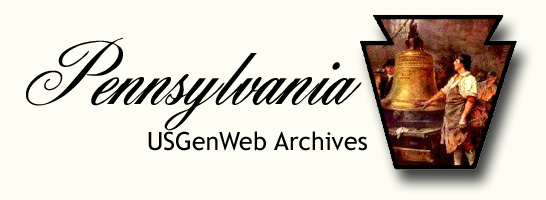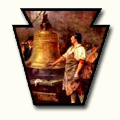| |
A History of Pittsburg and Western Pennsylvania Troops in the War
By John V. Hanlon (Copyright 1919 by The Pittsburg Press)
Chapter IX
(The Pittsburg Press, Sunday, March 2, 1919, pages 66-67)
Names in this chapter: Martin, Rowbottom, Moore, Fielding, Peacock, Carson,
Murphy, Stevenson, Riley, Otte, Davis, Gilham, Printz, McKenney, Vaughan,
Gleason, Ettinger, Woodbury
The Pennsylvania soldiers of the Twenty-eighth Division participated in the
strenuous fighting north of the Marne when the Americans were engaged in driving
the Boche out of the Soisson-Rheims salient. They belong to those famous
Keystone units which proved more that a match for the most noted of the kaiser’s
legions and distinguished themselves by their courage and fearlessness under the
most intense fire.
IN THE CAPTURE OF FISMETTE THE PITTSBURG AND WESTERN PENNSYLVANIA DOUGHBOYS
BATTLED WITH A COURAGE AND PERSISTANCE THAT OVERCAME ALMOST INSURMOUNTABLE
OBSTACLES. MANY ACTS OF VALOR WERE PERFORMED AND THE OLD IEGHTEENTH OF PITTSBURG
PLAYED A MAJOR PART IN THIS DEPAERATE ENTERPRISE. THE ENEMY HAD SET ABOUT TO
HOLD THE TOWN AT ALL COSTS IN ORDER TO CHECK THE ADVANCING YANKS WHO WERE
THREATENING THE ARMIES AND WAR MATERIALS OF THE CROWN PRINCE AND AS A RESULT
FISMETTE WILL BE REMEMBERED AND TALKED ABOUT LONG AFTER MANY OTHER OF THE
ACTIVITIES OF THE GREAT WAR ARE FORGOTTEN.
While the penetration of Fismette proceeded slowly, the
indomitable courage of the Pennsylvanians shone with a luster not to be
discounted even in the face of weather conditions which were anything but
favorable for their task. Rain fell incessantly. From a downpour to a drizzle it
varied and back again, but it never quite ceased. Friends and relatives at home
learned later of the tremendous difficulties and disadvantages under which our
brave boys labored at that time. That they dauntlessly and without fear faced
and overcame not only the most destructive war weapons of the enemy but the most
discouraging forces of the elements redounds to the credit and fame of the
Keystone soldiers and would render their niche in the hall of fame more securely
tenable if need be.
At every point of contact between the attacking and
defending forces the Germans displayed surprising morale and reacted viciously
against the irresistible onslaught of the doughboys. Despite the stubborn
resistance of the foe, many of whole soldiers were forced into battle and could
have yielded to the Yankees only under penalty of death, the advance of the men
under the Stars and Stripes was unhalted. True, it was slightly checked here and
there at times, but always uppermost in the minds of the Keystoners was the
thought of home and loved ones and the grim determination to win at all hazards
and at the earliest possible moment.
FIERCE BAYONET ACTION
The action consisted, in the main, of a series of sharp
local engagements. This was as true here as at every other point of contact
along the entire front between Soissons and Rheims. American bayonets play an
important role in the hand-to-hand fights, which were frequent.
The Hun hated the “cold steel” of the bayonets, but he
dreaded it still more. Unable to withstand the peppery rushes of the Americans,
he preferred to stand off and shoot or attack with gas and artillery.
Fortunately, the Hun was not given his choice. The Pennsylvanians knew full well
what weapon was deadliest to use, having been informed as to that by the British
and French veterans, and they used it to the limit.
The flight of time is undistinguishable and unrecorded
for the men who, amid the battle fever, know not what moment may prove their
last. Friends of boyhood days, chums of later years, comrades of training camp
and battlefield, disappear from human ken between sunrise and sunset, their
lives snuffed out in the twinkling of an eye. Brace indeed is the man who can
patiently and persistently “carry on” under circumstances like these. Yet that
is exactly what those heroes of ours were called upon to do, and how
magnificently they responded! What imperishable laurels of fame must be theirs
down through all the future years to the dim, distant end of earthly things,
“when time shall be no more.” Certainly no honor their government and their
countrymen can bestow upon will prove adequate reward for their long suffering
and valiant fight for the preservation of the principles of democracy.
PSYCHOLOGY OF WAR
Amid the peace and quiet of home life it is difficult
to grasp the psychology of the men going through these terrible trials. In a
single hour a dozen, perhaps half-hundred or more, comrades and close associates
of weeks and months of work and recreation may be wiped out of existence –
soldiers with whom the survivors have walked and talked daily and with whom,
perhaps, they were conversing when death stepped in to interrupt all these
relationships. Under such conditions men’s minds become abnormal and they are
prone, sometimes more from motives of downright anger than from any acknowledged
line of human reasoning, to perform deeds of prodigious bravery and endurance,
the like of which they could not conceivably achieve in their saner moments. The
best there is in a man – and the worst, to, must come out at such crises in his
career.
Loss of a relative, a friend or a close associate in
the home life is apt to mean much to the civilian, far from the perils of the
front line trenches, but it does not mean what the other thing does to the
soldier. Man’s physical condition and his mental status both are affected. Too
hungry to eat, too tired to rest, the soldier after vigils of from 24 to 36
hours without sleep, all the while being under a continuous mental and physical
strain, is likely to act as though he were under the influence of an opiate or
some other drug. Long internals elapse between meals and there is little to
drink that is fit to drink. Reaction comes unfailingly and therein lies the
reason that the soldier’s first day in “repose” usually is worse than the battle
itself. The longer his relief is postponed the greater the reaction, when it
does come, is likely to be.
The sense of proportion with which men are gifted is
lost and in its stead comes a feeling of bewilderment and perplexity as to the
meaning of spoken or written words or other communications from the surrounding
world. The physical being may support itself even without food, drink and rest
over a considerable period of time, but the effect on one’s senses is most
marked and seemingly a man’s reason totters to its downfall. As the sense of
proportion vanishes, all things ordinarily of prime importance fade into the
mental background, except, of course, the stern necessity of going on until at
last the task in hand is accomplished and the time for rest has come.
LOSES SENSE OF DANGER
In the midst of such stirring events the warrior feels
inevitable that his individual fate is a matter of slight importance. He knows
that he may “go west” at any moment, so he comes to regard his surroundings with
almost indifference, except as to that subtle sense which keeps him ever on the
lookout, subconsciously, to thwart the designs of the enemy. Sublime
forgetfulness of self, coupled with an ever increasing knowledge of how directly
the welfare of his beloved homeland may rest upon his own faithfulness to his
allotted task, keeps the fighter keyed up to a pitch the like of which it is
difficult for civilians to conceive.
Is it any wonder then that the officers and men
returned from “over there,” even those who escaped being wounded, plainly tell
us on their return home that one of their most difficult duties now is to “slow
down,” to recover the physical and mental poise which was theirs before they
personally entered the awful conflict?
That is exactly what Lieut. Col. Edward Martin, commander of the One Hundred and
Tenth infantry, told a little group of friends on a train en route via Pittsburg
from New York to his home in Waynesburg, Pa., just after his return from
overseas. Privates and officers of all ranks have said the same thing. Even the
pleasant excitement of a baseball game causes a reaction which leaves it impress
on mind and body for some time after the contest is over. Imagine then, if you
can, what serious effects must follow the deadly physical and mental strain of
days in the front line or the trenches with scant food and drink and perhaps no
sleep at all, exposed often to the rain, sleet, wind, hail or snow.
BECAME SUPERMEN
As the Germans hurled fresh regiments into the inferno
which their fiendishness had created, the Pennsylvania soldiers became almost
supermen. Representing a democratic and free people, to whom the thought of
human servitude or slavery is unthinkable, the Yankee soldier quickly displayed
such prowess and such valor that their deed of personal heroism multiplied
rapidly. Fear of death was abandoned and then came citations and decorations for
bravery in action, though many of the most deserving deeds unavoidably were lost
sight of in the heat of battle. It was enough for each man that he had seen his
duty and had done it. All bounds of personal fear of death of injury were
overstepped by the Yanks.
Small wonder was it then that the determined efforts of
the Germans to dislodge the Americans from Fismette were futile. Only a handful
of Pennsylvanians had yet gained a foothold in the town, but they held on
desperately. They refused to retire beyond the river’s edge. Fresh, vigorous
forces hurled at the position five times by the German commanders were repulsed
with heavy losses, despite the fact that all the time the Hun guns kept up an
incessant cannonade both on Fismette and Fismes, the latter being the town
across the river, and on the rear reaches of the Allied front, and that the
attacking forces were strongly supported by their machine guns and airplanes.
Back and forth across the river swayed the tide of battle. The Americans
succeeded in crossing once or twice, but were hurled back by vastly superior,
numerically, enemy forces, only to renew their advance against the foe with a
dash and courage, a wonderful gallantry, that has never been surpassed.

Lt. L. Howard Fielding
GALLANT PITTSBURGERS
The One Hundred and Eleventh infantry, formerly the old
Eighteenth regiment, N.G.P., “Pittsburg’s Own,” fought gallantly in the days and
nights that followed. As a constituent part of the Twenty-eighth division, the
One Hundred and Eleventh came into its own in the first penetration of Fismette.
Its officers and men took high rank in that heroic galaxy of fighters and,
though the regiment’s total of casualties swelled rapidly in the fiercest of the
fray, its morale held true to its traditions. Its record of grand merit in
former conflicts remained unsullied and new achievements were added to its
already magnificent record.
Brave deeds without number were inscribed on official
records to the credit of the old Eighteenth’s members. One of the most
noteworthy acts of individual heroism unquestionably was that of Corp. Raymond
E. Rowbottom, of Avalon, a supurb [sic] of Pittsburg, member of Co. E, and Corp.
James D. Moore, of Erie, Pa., member of Co. G.
In the house beyond the spinning mill on the western
edge of Fismette, these two soldiers were on outpost duty together. With them
were automatic rifle teams, defending the mill, which had been one of the most
desperately contested strongholds of the Huns. The size of the mill and its
thick stone walls made it valuable to either side. Had the firing post in the
house beyond the mill been lost, a battalion which was coming under Lieut. L.
Howard Fielding, of Lanerch, Pa., would have been left in deadly peril. Also the
whole military operation which centered around that point would have been
rendered much more difficult, if not indeed impossible. The mill was one of the
keynote positions of a considerable area about the town, hence upon the bravery
of the men in the house beyond it depended in great measure the success of the
efforts then being made by the American commanders.



SHOW RARE INITIATIVE
On the night of Aug. 12, 1918, a flare thrown from a
German post landed in the room where Moore and Rowbottom were. The whole room
was ablaze in a moment and it seemed impossible to save the house from
destruction. German snipers and machine gunners were thus given the chance they
had been wanting to see, their target. The attention of the American outpost was
distracted and they were threatened with being driven from their place of
concealment.
It was then that Rowbottom and Moore displayed that
singular coolness and initiative which has come to be recognized as a marked
characteristic of the Yank soldier in any crises, however unstable his nerves
may appear to be in less dangerous moments. No water was in the house except the
absurdly small quantity contained in the canteens of the men. Despite the
inadequacy of this supply of the precious fluid, Moore and Rowbottom used it to
such good effects and were so disdainful of the peril of burns on their hands
and feet that they quickly put out the blaze. Then they calmly resumed their
work with the automatic rifles. Considering that this bit of fire fighting was
done in a room as bright as day and under concentrated machine gun and sniper
fire, the feat may well be considered something more than merely remarkable. It
was heroic, nothing less.
Hours without water to drink passed then and the men
suffered the agonies of thirst until their tongues swelled and their throats
were parched. Both heroes were cited and decorated later for their brace defense
of the house.
WOUNDED HERO MANS GUN
On Aug. 10 a detachment of men from the One Hundred and
Eleventh captured some ammunition and enemy machine guns. The machine guns
captured were of the Maxim type, which few of the American soldiers knew how to
operate. Only one man of this squad, Corp. Raymond Peacock of Norristown, Pa., a
member of Co. F, could operate the Maxims. Wounded so badly in the left shoulder
just before that that his arm was practically useless, he nevertheless
volunteered to operate the gun. Despite excruciating pain from his wound, he
operated the gun in a spirited assault, firing the gun with his right hand until
he was wounded again. For this heroic work he was given the distinguished
service cross.
Private Lester Carson of Clearfield, Pa., a member of
Co. L, is another of the brave boys of the Pittsburg regiment who distinguished
themselves at about this point in the war. When an officer of the One Hundred
and Eleventh called for a runner to take a message from Fismette back to Fismes,
across the river, the path that had to be covered was raked with shells and
machine gun bullets. The man who volunteered was riddled with a score of bullets
when he had gone only a short distance. Heedless of this sight and of the danger
in which a second runner was sure to be, Private Carson volunteered and was sent
out with a duplicate of the message. His luck held good and he managed to get
through over the same route on which the other hero had failed. Private Carson
later was decorated for this piece of bravery.

RESCUES WOUNDED
At a point in the fighting a detachment of the One
Hundred and Eleventh was called back hurriedly from an advanced post, which it
was seen could be held only with great sacrifice. Five wounded men were left
behind unavoidably. Volunteering to go back after them, Private Albert R. Murphy
of Philadelphia, a member of the sanitary detachment, exhibited great bravery.
Murphy stuck to his task in the face of seemingly insurmountable obstacles and
the incessant and vicious fire from the enemy guns. Three days and three nights
of untiring effort were required before the last man was brought back.
Superlative valor was shown by the rescuers and for his part in this work,
Private Murphy was cited and received the distinguished service cross.
Lying in an exposes position was a sergeant of Co. C,
One Hundred and Eleventh infantry, who was shot and wounded Aug. 10. It remained
for Sergt. Alfred Stevenson of Chester, Pa., a member of the same company, to
volunteer to go to the rescue. Successfully making his way through fierce enemy
fire to the side of his wounded comrade, he leaned over the man and was
attempting to obtain a firmer grasp so he could carry him to safety. Just then a
sharp-shooter’s bullet struck Stevenson, who raised himself partly to his feed
and said to the wounded man: “Gee, they got me that time.” Another bullet struck
him and he fell dead.

SHOW SPLENDID HEROISM
In a clump of bushes lay the wounded men and there was
a considerable open space between him and our lines. Stevenson not reappearing,
Corp. Robert R. Riley of Chester, a member of the same company, with two
comrades, begged permission to go after the two men. On their first attempt, all
three were wounded and compelled to go back. Corp. Riley’s wound was not severe
and he insisted on another attempt. He went out again and found his old
schoolmate, Stevenson, dead. The man for whom the effort was made, was able to
crawl back to our lines after being given first aid treatment. Riley was unable
to complete the return to the lines without collapsing. He was carried in by
Private Edward Davis and taken to a hospital. There he recovered and was given
the distinguished service cross for his conspicuous bravery under fire.
Private Fred Otte of Fairmount City, Pa., a member of
Co. A, One Hundred and Eleventh infantry, during five days of the most intense
fighting, from Aug. 9 to 13, acted as a courier between his battalion
headquarters in Fismes and the troops in Fismette. After making several trips
across the Vesle river under heavy shell and machine gun fire, Private Otte
found that the bridge which he had been using had been destroyed. He then
continued his trips to and from headquarters by swimming the Vesle despite the
wire entanglements in the water. He received a distinguished service cross for
this performance, which was one of the most notable individual stunts accredited
to American soldiers “over there.”

CARRIED AMMUNITION
A Pittsburger who distinguished himself was Bugler
Harold S. Gilham of Co. H, One Hundred and Eleventh Infantry. He and Private
Charles A. Printz of Norristown, a member of Co. F, of the same regiment, not
only volunteered as runners to carry messages to the read but on their return
exhibited their contempt for the enemy by loading themselves with heavy boxes of
ammunition. This ammunition was needed badly and it was largely due to the
efforts of these brave men and their worthy comrades that the tide of battle did
not turn against us in those critical days.
On another occasion, during some of the most critical
and trying engagements of the now famous One Hundred and Eleventh, Sergt. James
R. McKenney of Pittsburg, a member of Co. E, took out a patrol to mop up a lot
of snipers who had been making havoc with some of our best forces. Returning
after a successful foray, he was exhausted and was ordered to rest but he begged
for another patrol. It was just such spirit as this that enabled the Yankees to
make such a splendid showing in the world war, even when pitted against the
crack Prussian Guards and others of the kaiser’s supposedly invincible forces.
Though gassed severely and wounded badly in the head by
shrapnel, Sergt. Richard H. Vaughan of Royersford, Pa., a member of Co. A, One
Hundred and Eleventh infantry, refused to be evacuated and after having his
wound dressed, continued to command his platoon until relieved four days later.
Sergt. Vaughan died soon after that, from the effects of his wound and the gas.
The distinguished service cross, which was awarded him, was sent to his father,
Dr. E.M. Vaughan, together with the text of the official citation. The
concluding paragraph of the citation was as follows:

WINS IMMORTAL PRAISE
“By his bravery and encouragement to his men he
exemplified the highest qualities of leadership.”
Another hero who deserved and won official recognition
and reward was Corp. James W. Gleason of Pottstown, Pa., a member of Co. A, One
Hundred and Eleventh infantry. He was commended publicly and given the
distinguished service cross for his “great aid in restoring and holding control
of the line in absolute disregard of personal danger and without food or rest
for 72 hours.”
Three sleepless days and nights, aiding and encouraging
their men to hold a position, were spent by Lieut. Walter Ettinger of
Phoenixville, and Lieut. Robert B. Woodbury of Pottstown, the former an officer
of Co. D, One Hundred and Eleventh infantry, the latter of Co. M , same
regiment.
Scarcely second to the physical hardihood and bravery
shown by the Western Pennsylvania, as well as men from other parts of the state,
was their moral courage. Far from home and loved ones, they waited often for the
letter that did not come, the endearing message of encouragement that would have
meant so much to the tired and battle-worn heroes. Patiently they endured the
discomforts which are the fortunes of war. Complaint was seldom heard from the
men while there was yet fighting to be done. Grimly, tenaciously, with a depth
of purpose known only to those who have been tried in fire and have come out
pure gold, these brave boys struggled on until their task was finished – and
they wrote cheery letters home. The world owes them a debt it can never repay.


|
|













